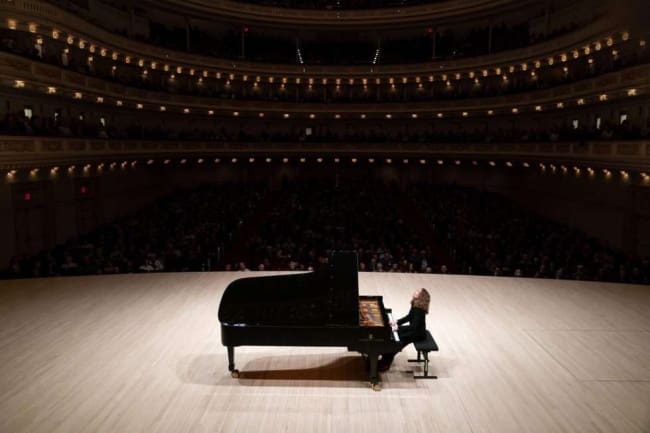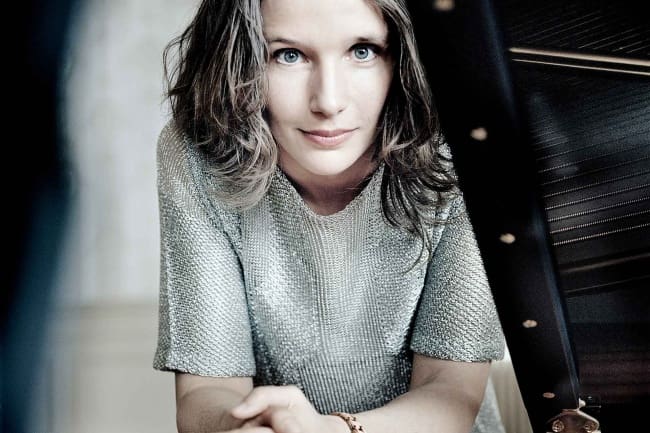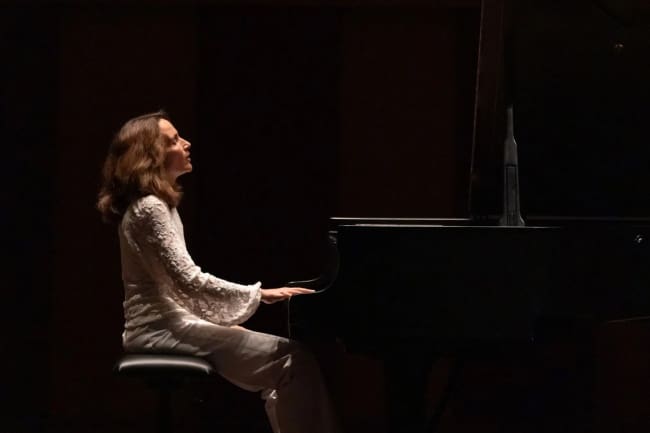“I’ve always had a special relationship with the German Romantics,” says Hélène Grimaud (in a recent interview for Deutsche Welle). “These are worlds in which I feel I can express what the composer intended.” That affinity is very much in evidence on her latest album, For Clara, which focuses not only on the pianist’s own relationship with the music of both Robert Schumann and his protégé Brahms, but also on that which bound both men to pianist-composer Clara Schumann (née Wieck). Grimaud revisits Schumann’s Kreisleriana, a work she has known most of her life and recorded once before, pairing it with Brahms’s three Op. 117 Intermezzi and his Op. 32 set of nine songs. Joining her for the latter is baritone Konstantin Krimmel, her musical partner on the Valentin Silvestrov album Silent Songs, released earlier this year (“Konstantin Krimmel and Hélène Grimaud deserve the highest praise for their poised and unaffected account of this beautiful, dreamlike music”, BBC Music Magazine).
For Clara will be released by Deutsche Grammophon on CD, vinyl and digitally on 8 September. Filmed in the library of Polling Abbey near Munich, in June 2022, Hélène Grimaud’s performance of Kreisleriana will be available on demand on STAGE+ from 10 July 2023, while her Berlin recital with Konstantin Krimmel, featuring Brahms’s Op. 32, can be streamed from the platform now. Grimaud’s recordings of two further Brahms intermezzi – Op. 116 No. 2 in A minor and Op. 118 No. 2 in A major – will be issued as e-singles on 13 October and 24 November respectively.
“Kreisleriana is one of the most sublime, transcendent pieces of the Romantic piano literature“
Hélène Grimaud
Writing to his beloved Clara in the spring of 1838, two years before they were finally able to get married, Robert Schumann told her how central she was to the new volume of works that were currently flowing from his pen – “You will smile so sweetly when you find yourself reflected there.” He named this set of eight enormously varied solo piano pieces Kreisleriana, after Johannes Kreisler, the eccentric, unpredictable composer invented by writer E.T.A. Hoffmann. Calling it “one of the most sublime, transcendent pieces of the Romantic piano literature”, Grimaud captures the shape-shifting instability and mercurial changes of mood – as typical of Schumann himself as of his fictional counterpart – which characterise Kreisleriana as it alternates between tenderness and turbulence, restlessness and repose.
Brahms met the Schumanns in 1853, when he was just 20, and both husband and wife immediately began to champion his music, with Clara adding his works to her own concert programmes. As Robert’s health deteriorated, she and Brahms developed a friendship that lasted until her death in 1896 (Brahms himself died the following year). Even late in life, he sought Clara’s opinion on new compositions, such as the three wistful, elegiac intermezzi recorded here, written in 1892. Reviewing a recent performance of Op. 117 in Freiburg, the Badische Zeitung wrote: “Grimaud offered these profound musical outpourings as the composer surely intended them to be heard: a lyrical reflection on a rich artistic life. With autumnal colours, melancholic and brooding.”
For Clara ends with the nine songs that make up Brahms’s Op. 32. Composed in the early 1860s, they set poems by two orientalist poets, Georg Friedrich Daumer and August von Platen, both of whom were influenced by the medieval Persian poet Hafez. While all nine are written in the first person, there is no single narrative thread running through Brahms’s choice of poems, which perhaps explains why the set is rarely performed in full today. Together, Hélène Grimaud and Konstantin Krimmel movingly convey the themes of love, loss, devotion and disillusionment which are expressed by both words and music, and might in some ways have echoed the composer’s feelings towards Clara. The artists bring the album to a close with a beautiful interpretation of the ninth and final song, “Wie bist du, meine Königin” (My queen, you are so wondrous), a masterpiece of the Romantic repertoire.
As for Grimaud’s relationship with the Romantics, it seems set to continue for many years to come. “Those original friendships have evolved,” she explains, “but they’ve never diminished in importance, and they will always be with me, until the end.”
Source: Deutsche Grammophon










